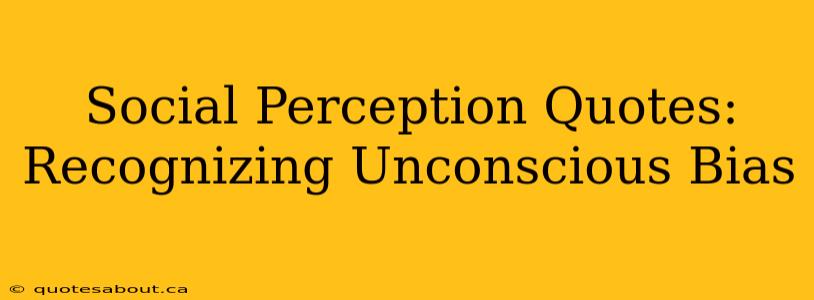Social Perception Quotes: Recognizing Unconscious Bias
Our social perceptions—how we understand and interpret the actions and characteristics of others—are profoundly shaped by unconscious biases. These biases, often operating outside our conscious awareness, can significantly impact our interactions, judgments, and even our decisions. Understanding these biases is crucial for fostering more equitable and inclusive relationships and societies. This article delves into the complexities of social perception, exploring the influence of unconscious bias and offering strategies for recognizing and mitigating its effects. We'll also examine some insightful quotes that highlight the subtle yet powerful role of bias in shaping our understanding of the world and the people within it.
What is Unconscious Bias?
Unconscious bias, also known as implicit bias, refers to the attitudes or stereotypes that affect our understanding, actions, and decisions in an unconscious manner. These biases are often ingrained through societal norms, cultural influences, and personal experiences. They can manifest in various forms, including racial bias, gender bias, age bias, and many more. It's important to remember that having unconscious biases doesn't automatically make someone a prejudiced person; rather, it highlights the inherent human tendency to categorize and make quick judgments based on limited information. The key lies in recognizing these biases and actively working to counteract their influence.
How Does Unconscious Bias Affect Social Perception?
Unconscious bias significantly distorts our social perceptions by influencing how we interpret information and interact with others. For example, a hiring manager might unintentionally favor candidates who resemble them, overlooking equally or more qualified candidates from different backgrounds. Similarly, a teacher might unconsciously hold higher expectations for students from certain demographics, impacting their teaching style and assessment strategies. These subtle biases can have far-reaching consequences, perpetuating inequalities and hindering opportunities for individuals from marginalized groups.
"The greatest enemy of knowledge is not ignorance, it is the illusion of knowledge." – Stephen Hawking
This quote perfectly encapsulates the danger of unconscious bias. We may believe we are objective and fair in our judgments, but our unconscious biases can create an illusion of knowledge, blinding us to the true nature of the situation and the individuals involved. Recognizing this illusion is the first step towards overcoming the detrimental effects of bias.
What are Some Strategies for Recognizing Unconscious Bias?
Becoming aware of our unconscious biases is a continuous process, requiring self-reflection and a willingness to confront uncomfortable truths. Here are some effective strategies:
- Self-reflection: Regularly examine your own thoughts, feelings, and actions to identify potential biases. Consider keeping a journal to track your observations.
- Seek diverse perspectives: Actively engage with people from diverse backgrounds and listen to their experiences. This can challenge your preconceived notions and broaden your understanding.
- Educate yourself: Learn more about the various forms of unconscious bias and their impact. Numerous resources, including books, articles, and workshops, are available.
- Practice empathy: Try to understand the perspectives and experiences of others, even if they differ from your own.
- Challenge assumptions: Question your assumptions and stereotypes. Are they based on facts or prejudice?
How Can I Mitigate the Effects of Unconscious Bias?
Mitigating the effects of unconscious bias requires conscious effort and ongoing commitment. Here are some strategies:
- Slow down: Take your time when making decisions that involve interacting with or judging others. Rushing can exacerbate unconscious biases.
- Use objective criteria: Develop clear, objective criteria for decision-making to minimize the influence of personal biases.
- Seek feedback: Regularly solicit feedback from others, especially those from diverse backgrounds.
- Blind review processes: Implement blind review processes whenever possible, removing identifying information that might trigger biases.
- Promote diversity and inclusion: Create inclusive environments that value diverse perspectives and experiences.
"Prejudice is a burden to those who are prejudiced." – Leo Tolstoy
This quote highlights the personal cost of harboring unconscious biases. Carrying the weight of prejudice limits our ability to connect with others authentically and fully experience the richness of human diversity.
Conclusion: The Path to More Equitable Interactions
Recognizing and mitigating unconscious bias is a crucial step towards fostering more equitable and inclusive interactions. By actively engaging in self-reflection, seeking diverse perspectives, and implementing strategies to reduce the influence of bias, we can create a more just and harmonious society. Remember, the journey toward unbiased social perception is ongoing, requiring continuous learning, self-awareness, and a commitment to creating a more equitable world for all.

